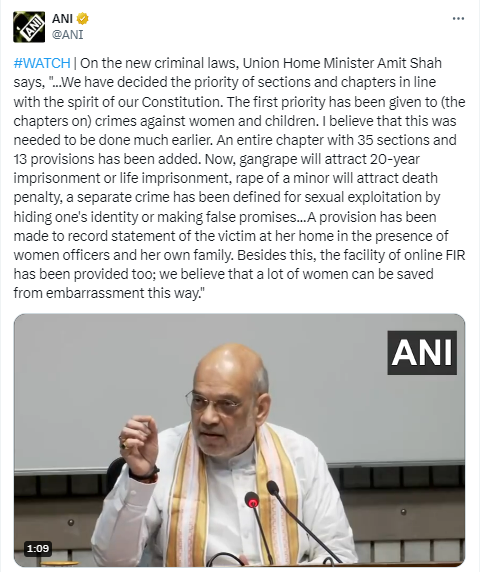What Are The Grey Areas In India’s New Criminal Laws? Key Points Explained
The new criminal laws implemented by the Indian government included several new reforms with few grey areas!

India’s new criminal laws, set to take effect on July 1, mark a significant shift from colonial-era legislation. These new laws include the Bharatiya Nyaya Sanhita (BNS), Bharatiya Nagarik Suraksha Sanhita (BNSS), and Bharatiya Sakshya Adhiniyam (BSA), which will replace the Indian Penal Code (IPC), Criminal Procedure Code (CrPC), and Indian Evidence Act, respectively. While the changes aim to modernize India’s criminal justice system, they also introduce several grey areas and points of contention.
Sedition Offense and Section 377 Concerns
One main concern is the redefinition of sedition offences. Critics argue that the new definition could be misused to curb free speech and suppress dissent. Moreover, removing section 377, dealing with non-consensual s*xual acts involving men raises questions about male victims legal protections against s*xual violence.
Impact on Legal and Social Landscapes
India’s legal and social landscapes will largely depend on how BNSS is implemented and enforced. It must be noted that Union Home Minister Amit Shah has stressed that these laws embody Indian values while putting justice above punishment. On the other hand, critics express their fear over police powers that have been extended by BNS as well as its implications for human rights.
VIDEO | “These (criminal) laws (The Bharatiya Nyaya Sanhita, The Bharatiya Nagarik Suraksha Sanhita, and The Bharatiya Sakshya Adhiniyam) have come replacing the laws (IPC, CrPC, Indian Evidence Act) made by the Britishers. It will give justice, speedy trial, and protection to… pic.twitter.com/OqjboZbmhH
— Press Trust of India (@PTI_News) July 1, 2024
Also Read: From Faster Trials To Stricter Rape Laws, 10 Things You Should Know About The New Criminal Laws
Key Concerns In The New Laws
1) Extension Over Police Custody – The new law extends police custody from 15 days to a period of 60-90 days. This may enable an increase in misconduct by police leading to forced confessions thereby undermining fair trial systems.
2) Prosecution Authority – Now it is up to individual policemen to decide whether or not they are going to prosecute under this act or any other already existing law such as UAPA: there are no clear guidelines. The inconsistent application of this conduct may arise in the future with some people questioning its fairness.
3) Vague Offences Description – The laws define various offences that may be classified as terrorism, organized crime and acts endangering sovereignty. These kinds of imprecise laws are not only capable of being arbitrarily enforced but also pose a danger to some essential rights like freedom of speech.
4) Definition of Terrorism – The wide interpretation of terrorism now includes acts that disturb public order or destabilize the country thus increasing chances for misuse and legal action against peaceful dissent and protest.
5) No Legal Aid Provision – The new legislation has done away with provision for legal aid from the point of arrest which means that getting fair representation in court may be difficult for marginalized individuals.
The government has made various preparations to ensure a smooth rollout including training programs and technological changes. All these efforts are meant to ease the national implementation process of the new legislation.
First Published: July 01, 2024 4:23 PM














